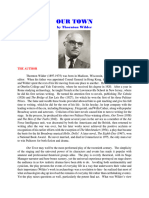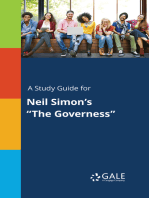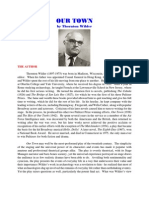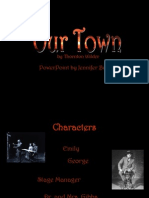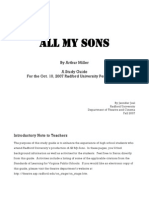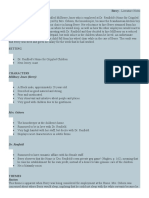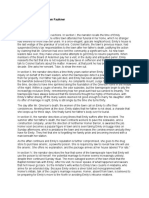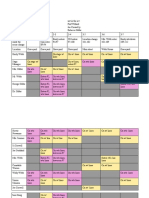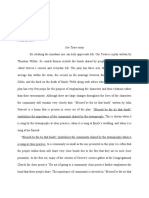Our Town
Our Town
Uploaded by
T_art_clayCopyright:
Available Formats
Our Town
Our Town
Uploaded by
T_art_clayOriginal Title
Copyright
Available Formats
Share this document
Did you find this document useful?
Is this content inappropriate?
Copyright:
Available Formats
Our Town
Our Town
Uploaded by
T_art_clayCopyright:
Available Formats
Our Town Summery
Our town is a play performed in three acts. Each act is labeled as a part of life, beginning with the age of youth in Act I. In this act we meet our primary characters, George Gibbs and Emily Webb. The story is told by a stage manager from the present age, who is constantly providing details that only someone who knew what was going to happen could provide. The other characters in this play have only one purpose, to set the mood of the scene. The stage, although seeming bare, is decorated with the elaborate words of the stage manager as he describes the small town of Grovers Corners as it was back in 1901. In Act I the stage manager tries to create a feel for the town. Pulling people from the towns history to recreate what a typical day in Grovers Corners would have been like. We focus on the young adults, Emily Webb and George Gibbs. Emily is a bright young girl who is clearly focused on school, while in comparison George Gibbs is seemingly more interested in baseball and the running of his uncles farm. George, apparently fond of Emily, contrives ways to be near Emily as much as he possibly can, creating a friendship that will later bloom into love. Act II focuses on the growing and learning aspect of life. Set three years into the future we overhear several of the towns people conversing about the upcoming wedding of George Gibbs and Emily Webb. The houses were in an uproar over the wedding, each one mourning the growing of their children. As the households bustled about, preparing for the wedding, the stage manager refocuses our attention to a turning point in George Gibbs and Emily Webbs lives. It was the end of a school day and George Gibbs was desperately trying to get Emily's attention. After much subtle avoiding from Emily, George's persistence wins out and she relents to let him walk her home. On their way home George confronts Emily on the fact that she has been avoiding him for several weeks, to which she confirms that she was indeed retracting from conversations. After she confessed that she had withdrawn because of his obsession with baseball, and lack of caring for anyone outside of his baseball life, he quickly took her words to heart. Reflecting upon her words he realized that he truly cared about her opinion, and her. Finally confronting his character flaw he quickly reevaluated his plans of going off to college. After a brief argument about his plans for the future, he tells Emily he wishes to spend the rest of his life in Grovers Corners, preferably with her. After she returns his expression of love the stage manager again redirects our attention to the wedding. It is set right before the wedding and both parties are have wedding day apprehensions. Each one afraid of growing up. After reassurance from their parents, they continued with the wedding without any physical appearance of doubts. Act II ends with the saying of I dos and commentary of a local lady as to the meaning of life. Act III is the manifestation of death. The scene opens in a graveyard, and the undertaker is preparing for the newest body. The stage manager informs us that nine years have passed and several of our loving characters have passed away. The undertaker begins conversing with a young man by the name of Sam Craig about the people who have recently passed in Grovers Corners. The most recent of which was a cousin, Emily. The play shifts to those who are dead. They are expecting the arrival of Emily any minute, and pass the time by talking about how she died. She had died giving birth to her second child. When Emily arrived she couldn't get passed the feeling of being dead. She couldn't deal with the fact that she could never get back the time she wasted. As her funeral proceeded she noticed small details that she had forgotten before. When it was over she asked Mrs. Gibbs if it was possible to live again at least for one day. Despite warnings from practically all of the dead she was insistent about returning for at least a day. She, however, did take their warning about not picking a monumental day in her life. She picked her eleventh birthday, starting the day off at dawn. The scene changes and she finds herself on main street at dawn. She sees all the people she knew as a child, some of them now deceased. When she makes it to her house the stage manager asks about certain things she might remember about the day.
Outline Introduction: Our Town is Act I Summery: Act II Summery: Act III Summery: Conclusion:
You might also like
- Our Town Newest ScriptDocument24 pagesOur Town Newest ScriptAzalea Berliana83% (6)
- Our Town by Thornton WilderDocument1 pageOur Town by Thornton WilderChris O'BrienNo ratings yet
- Our TownDocument12 pagesOur TownSeven Eight Hung100% (1)
- Three Female MonologuesDocument2 pagesThree Female MonologuesBecca Owen0% (2)
- Thornton Wilder Our TownDocument10 pagesThornton Wilder Our TownAngelina100% (1)
- All My SonsDocument25 pagesAll My SonsJo Jo100% (1)
- The Father by Bjornsterne BjornsonDocument15 pagesThe Father by Bjornsterne BjornsonQwertyGhurl230% (1)
- CSEC Short Stories NotesDocument17 pagesCSEC Short Stories NotesKaminie Singh67% (3)
- Away-Michael Gow AnalysisDocument3 pagesAway-Michael Gow AnalysisAndrew100% (2)
- Thornton Wilder Our TownDocument10 pagesThornton Wilder Our TownAngelina100% (1)
- Our TownDocument11 pagesOur TownryumacleodNo ratings yet
- Our Town Characters and Their AttributesDocument6 pagesOur Town Characters and Their Attributesapi-222116555No ratings yet
- Reading Mas ExplicacionDocument9 pagesReading Mas ExplicacionLuis Felipe Ccahuay NiñoNo ratings yet
- Our Town First LectureDocument22 pagesOur Town First LectureBrave TravelerNo ratings yet
- Our Town Questons and QuizDocument6 pagesOur Town Questons and Quizchildress8No ratings yet
- Powerpoint by Jennifer BufkinDocument15 pagesPowerpoint by Jennifer BufkinCary OrtizNo ratings yet
- Miss Emily Grierson As A Foil Character of JigDocument5 pagesMiss Emily Grierson As A Foil Character of JigIshtiaq AhmedNo ratings yet
- Ben BrewsterDocument3 pagesBen BrewsterOğuzhan DemirbaşNo ratings yet
- Our Town - AuditionsDocument5 pagesOur Town - Auditionsggabriellaruiz4No ratings yet
- A Rose For EmilyDocument5 pagesA Rose For Emily11 moonflowerNo ratings yet
- The Analysis of Our TownDocument15 pagesThe Analysis of Our Townindra_uh0540% (5)
- All My Sons: by Arthur Miller A Study Guide For The Oct. 10, 2007 Radford University PerformanceDocument12 pagesAll My Sons: by Arthur Miller A Study Guide For The Oct. 10, 2007 Radford University PerformanceVivveck Nayudu25% (4)
- Introduction To Drama: Students Name: ID: 193020037, Subject Code: ENG 205 Course Teacher: Ashik IstiakDocument3 pagesIntroduction To Drama: Students Name: ID: 193020037, Subject Code: ENG 205 Course Teacher: Ashik IstiakMashrur Ahbab MugdhoNo ratings yet
- After Twenty Years Analysis PDFDocument32 pagesAfter Twenty Years Analysis PDFPriyasha GhoshNo ratings yet
- Protagonist: A Rose For EmilyDocument3 pagesProtagonist: A Rose For EmilyIesha ClarkNo ratings yet
- The Chapter Two - SummeryDocument2 pagesThe Chapter Two - SummeryJimena Cardozo100% (1)
- English B Prose ReviewDocument24 pagesEnglish B Prose ReviewShay HarrisonNo ratings yet
- An Inspector Calls Revision NotesDocument24 pagesAn Inspector Calls Revision Notestanhim_hasan50% (2)
- An Inspector Calls NotesDocument19 pagesAn Inspector Calls NotesTanhim HasanNo ratings yet
- Creative NonficDocument9 pagesCreative Nonfic21-50292No ratings yet
- Look Back in Anger Characters Themes SymbolismDocument3 pagesLook Back in Anger Characters Themes Symbolismadelshaban64No ratings yet
- All My Sons - Study GuideDocument18 pagesAll My Sons - Study GuidePiyush Dahiya100% (2)
- Look Back in Anger Short QuestionsDocument8 pagesLook Back in Anger Short QuestionsNoor Ul Ain90% (10)
- A Rose For EmilyDocument25 pagesA Rose For Emilyii9354No ratings yet
- The Importance of Being Ernest: The Life of Actor Jim Varney (Stuff that Vern doesn't even know)From EverandThe Importance of Being Ernest: The Life of Actor Jim Varney (Stuff that Vern doesn't even know)Rating: 4.5 out of 5 stars4.5/5 (2)
- Summary Act One Look Back in Anger 4Document5 pagesSummary Act One Look Back in Anger 4Salwa abNo ratings yet
- Look Back in AngerDocument5 pagesLook Back in AngerVijay IlkarNo ratings yet
- The Way of The WorldDocument2 pagesThe Way of The WorldPhantomNo ratings yet
- EmmaDocument8 pagesEmmaCollin EdwardsNo ratings yet
- Look Back in AngerDocument17 pagesLook Back in AngerVijay Ilkar100% (1)
- IT by Stephen King (Book Analysis): Detailed Summary, Analysis and Reading GuideFrom EverandIT by Stephen King (Book Analysis): Detailed Summary, Analysis and Reading GuideNo ratings yet
- Exercise2 4Document1 pageExercise2 4api-329330134No ratings yet
- CSEC Short Stories NotesDocument15 pagesCSEC Short Stories NotesPooNo ratings yet
- The Jeffersons Jenny ThesisDocument8 pagesThe Jeffersons Jenny Thesislniaxfikd100% (2)
- A Rose For Emily SummaryDocument8 pagesA Rose For Emily Summarynonne2246945No ratings yet
- Certified EducatorDocument9 pagesCertified EducatorAayan LakhwaniNo ratings yet
- A Rose For EmilyDocument4 pagesA Rose For EmilyJohnrel SecretariaNo ratings yet
- A Rose For EmilyDocument8 pagesA Rose For EmilyIoana NemesNo ratings yet
- TG What's Eating Gilbert Grape 10 PagesDocument11 pagesTG What's Eating Gilbert Grape 10 PagesKweka NyawNo ratings yet
- John Osborne's Look Back in Anger Hustiu DDocument4 pagesJohn Osborne's Look Back in Anger Hustiu DDiana MihaelaNo ratings yet
- Look Back in AngerDocument4 pagesLook Back in AngerGeorge LaCroixNo ratings yet
- A Rose For Emily (Analysis)Document4 pagesA Rose For Emily (Analysis)Do Re Mi67% (3)
- To Kill A Mockingbird at A GlanceDocument4 pagesTo Kill A Mockingbird at A Glancestay goldNo ratings yet
- A Rose For Emily by William FaulknerDocument2 pagesA Rose For Emily by William Faulknerhoney jean gomezNo ratings yet
- Look - Back - in - Anger General NoteDocument4 pagesLook - Back - in - Anger General NoteWungreiyon moinao100% (1)
- Critique - All My SonsDocument2 pagesCritique - All My SonsphilemonNo ratings yet
- Our Town Play SchematicDocument4 pagesOur Town Play Schematicrebekah_clare100% (1)
- Our Town Scene BreakdownDocument3 pagesOur Town Scene BreakdownFrankie Rose III0% (1)
- Our TownDocument2 pagesOur TownT_art_clayNo ratings yet
- Our Town Act 3 - French ScenesDocument2 pagesOur Town Act 3 - French ScenesCatherine OnsiNo ratings yet
- "Our Town" EssayDocument3 pages"Our Town" EssayKajsa Beckett G-mNo ratings yet
- Our Town Study GuideDocument4 pagesOur Town Study GuideryumacleodNo ratings yet
- Township Recovering Following Hurricane: Don't Miss Our Town' This WeekDocument12 pagesTownship Recovering Following Hurricane: Don't Miss Our Town' This WeekelauwitNo ratings yet
- Our Town QuestionsDocument4 pagesOur Town QuestionsnfranklinbhsNo ratings yet
- Production Research Summary OutlineDocument5 pagesProduction Research Summary Outlineapi-383824116No ratings yet
- Our Town (WILDER, Thornton) - Resource-GuideDocument12 pagesOur Town (WILDER, Thornton) - Resource-GuideTeresa PaivaNo ratings yet
- Wonder-R J PalacioDocument31 pagesWonder-R J Palacioთეკო ბექაურიNo ratings yet
- Our Town Act 3Document15 pagesOur Town Act 3Kyaw HnaineNo ratings yet
- Avery Jeakins - Our Town Act 2 QuestionsDocument4 pagesAvery Jeakins - Our Town Act 2 QuestionsaveryjeakinsNo ratings yet
- Our Town Thornton Wilder ThesisDocument4 pagesOur Town Thornton Wilder Thesisafknwride100% (1)
- Elements of Theater - OUR TOWN-0Document52 pagesElements of Theater - OUR TOWN-0Ralph AbaoNo ratings yet
- Our Town Study GuideDocument24 pagesOur Town Study GuideSjumx Secret100% (1)
- Our Town Theme EssayDocument3 pagesOur Town Theme EssaygomNo ratings yet
- Sample Monologues PDFDocument5 pagesSample Monologues PDFChristina Cannilla100% (1)
- Our Town InformationDocument12 pagesOur Town Informationchildress8No ratings yet
- The Analysis of Our TownDocument15 pagesThe Analysis of Our Townindra_uh0540% (5)
- Cozy Town 2.0Document44 pagesCozy Town 2.0Ezequiel Ferreyra0% (1)
- Our Town EssayDocument5 pagesOur Town EssayTylerNo ratings yet


